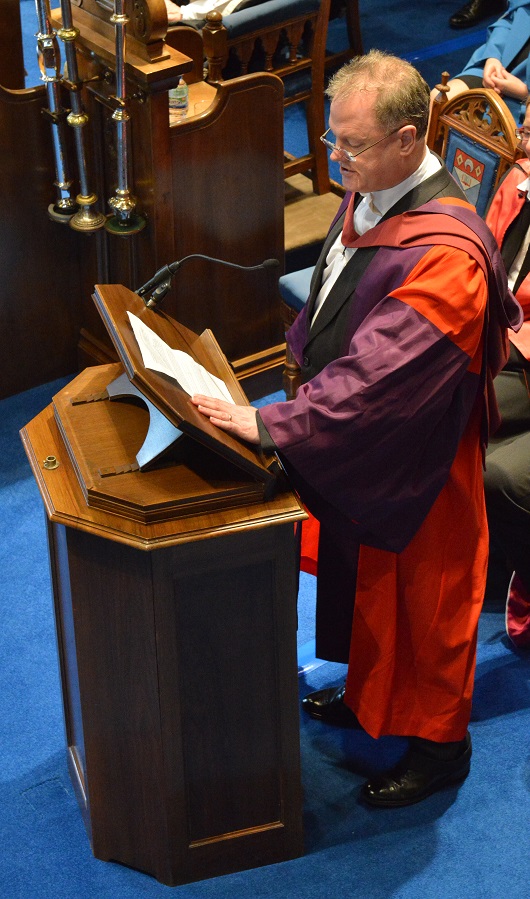Graduation address: Dr Ian Johnson

Vice-Chancellor, ladies and gentlemen.
I teach Geoffrey Chaucer’s Canterbury Tales – an encyclopaedia of types of people, of human experience (personal and social), of types of stories. Like Canterbury, mediaeval St Andrews was an international destination for pilgrims – but, unlike Canterbury, St Andrews was, within a few years of Chaucer’s death, able to boast a university.
You all individually can boast your own Tales of St Andrews – your own personal collection of narratives of instruction and mirth – lessons learnt, quite a few of them not academic ones. Narrative is a way of structuring and giving shape to experience, only in your cases, unlike Chaucer’s pilgrims who merely told the tales, you feature in all the stories (even if only as a witness). Appraise your own narratives: profit from them; enjoy them; wince a little, occasionally.
At the end of the Tales, the pilgrims arrive at the outskirts of the great city. The Parson tells the last tale, to ‘knytte up alle this feeste and make an ende’: we hear no more of the pilgrims and their stories. Pitched on the very edge of the future, The Unknown, they have to step out of one narrative into another yet-unwritten story. Gradus = step: you are stepping out now.
But… stepping into The Unknown; discovering; interpreting it – and finding out about yourself – is just what you have been up to for the last four years. The next steps, gradus upon gradus, are for you – beautifully shod as I can see you all are!
Your Tales of St Andrews are of course shared with other students – companions/fellow-pilgrims on your four-year journey – and not just those taking your modules, but your academic parents, children and siblings; those colleagues in the University who have supported you: the academics, the janitors, cleaners, caterers, secretaries, admin staff, Student Services staff, Estates – all of them; and, of course, the people of St Andrews and Fife.
It is up to you, as you step out from here, to profit from it: to take the fruit, the wheat – and let the chaff be still. OK, so you have acquired an array of those ‘CV-able’ ‘transferable skills’, those box-ticking accomplishments. All very necessary and desirable. But you will also have more that is not so copiably ‘CV-able’: how to be unflinchingly critical without being personal but remaining constructive; how to achieve and make the most of a productive level of confusion; how to know how and when to have the last word (to be decisive and close a problem); how and when to have the first word (and open up something new whose consequences are yet unforeseen); how to hold irreconcilables in your head at the same time; how to interpret not just the surface content of information or behaviour but its motives, tones, premises, validity, inconsistencies, ethical import and utility. So, carry on as you have been taught and as you have thought. Do not just take ‘no’ for an answer. Do not just take ‘yes’ for an answer. And do not take just an answer for an answer.
Parents, families, friends, supporters of our new graduates: thank you for helping to get them here in the first place; thank you for sustaining them through their time here.
Thanks too to our new graduates. Like all my colleagues, I learn all the time from students’ brilliance and flair in what they say and write (even if it never included the correct use of the semicolon!). Still, how many times have I said ‘I wish I’d written that’ – or heard colleagues say it?
I therefore finish with the real-life eloquence of 2015 graduates, as inscribed in a card from a remarkable quintet of final-year Dissertation students:
Dear Dr Johnson,
Just a note to thank you for not throwing us from your office window at any point this semester. It is much appreciated.
Now that’s what I call good academic manners. Friends and families please be reassured: defenestration is not current policy in the ongoing suite of St Andrews teaching practices (though I would have to check with the Proctor to see if it is in the regulations).
Anyhow, there is a more telling point here. This card, signed individually, was also signed by a group of fellow travellers. Each student was irreducibly themself and as distinctive as their handwriting; each student utterly fascinating (including the episodes of self-doubt and the occasional drama); each student irreplaceably individual – and all of them talented. But they were also a group who really looked after each other; saw each other through all those dark afternoons of the soul: a sum generously greater than its parts.
For me, this typifies St Andrews students – typifies you: gifted and genuine individuals in a real community. Do not lose this, as you step out, freshly graduated. Remember who you are. Do not ever lose this from your story as it unfolds under your own direction.
Have a wonderful graduation day. Enjoy every second of it: it is for you and for yours. Warmest congratulations. All the very best for the future! Well done!
Category University news